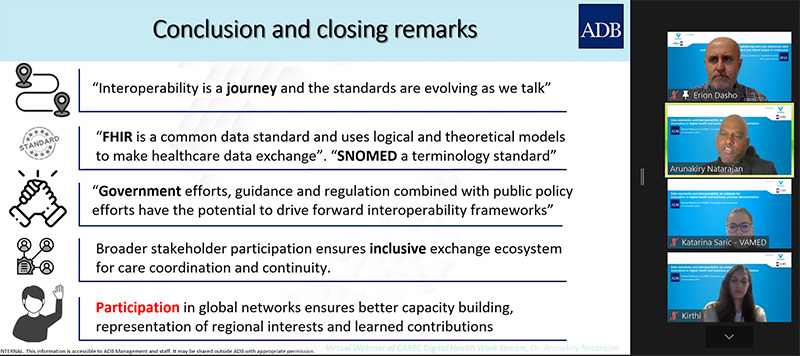On December 14, 2022, on behalf of management4health GmbH (m4h), Dr. Arunakiry Natarajan and Dr. Erion Dasho delivered a joint webinar on “Data standards and interoperability as catalysts for innovation in digital health and business process documentation”. This multi-stakeholder webinar, consisting of participants from countries such as Kazakhstan, the Kyrgyz Republic, Mongolia etc., was attended by a live audience of different stakeholder domains including digital health professionals from the Central Asia Regional Economic Cooperation Program (CAREC) and the Caucasus.
The main topics that were discussed were interoperability standards and ways to implement them in practice as well as strategic approaches such as The Open Group Architecture Framework (TOGAF®), agile methodology, etc.
The webinar was organised in the context of the Asian Development Bank (ADB) funded project “Addressing Health Threats in Central Asia Regional Economic Cooperation Countries and the Caucasus” that is implemented by a consortium of the companies VAMED and m4h.
Even though all countries in the region are successfully reducing their infectious disease burden, the region remains vulnerable to outbreaks from epidemic-prone emerging infectious diseases (EID) and transboundary animal diseases (TAD), as demonstrated by the coronavirus. While the COVID-19 pandemic arrived relatively late in many CAREC countries and in the Caucasus, the number of cases has increased rapidly in most countries, reflecting the region’s vulnerability. The framework aims to strengthen regional health co-operation of the CAREC countries.
In particular, innovative solutions in response to the ongoing coronavirus disease pandemic will be developed; and to jointly prevent, prepare for, and respond to regional health threats capacities will be build. This technical approach is a timely response not only to the COVID-19 crisis but also for likely future health threats and builds on existing networks and projects in the region, addressing sectoral and institutional fragmentation and uncoordinated approaches.




